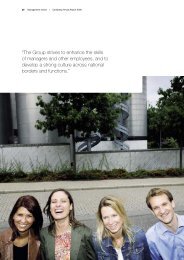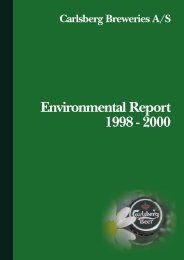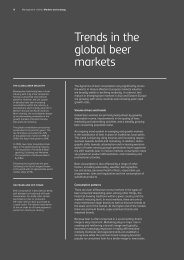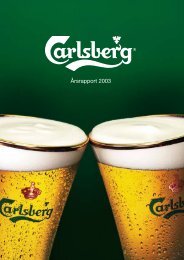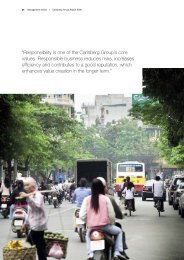Report and Accounts 1999 / 2000 - Carlsberg Group
Report and Accounts 1999 / 2000 - Carlsberg Group
Report and Accounts 1999 / 2000 - Carlsberg Group
Create successful ePaper yourself
Turn your PDF publications into a flip-book with our unique Google optimized e-Paper software.
<strong>Group</strong> Staff Functions<br />
25<br />
• <strong>Carlsberg</strong> will systematically endeavour to<br />
minimise adverse effects on the environment<br />
<strong>and</strong> optimise the use of natural resources.<br />
The essential environmental parameters<br />
The most important environmental endeavours<br />
include the effort to limit resource consumption,<br />
e.g. water <strong>and</strong> energy, as well as waste water<br />
treatment <strong>and</strong> reduction.<br />
Brewing <strong>and</strong> bottling of beer <strong>and</strong> soft drinks<br />
obviously requires consumption of vegetable raw<br />
materials, water, energy <strong>and</strong> packaging materials.<br />
The production processes generate waste water<br />
<strong>and</strong> solid waste material <strong>and</strong> the energy producing<br />
breweries also discharge flue gas from<br />
combustion. Furthermore, noise <strong>and</strong> odour emission<br />
may occur from production plants <strong>and</strong> distribution<br />
activities. To the extent possible, auxiliary<br />
substances are used, including cleaning materials,<br />
which do not affect the environment if used correctly.<br />
Before <strong>Carlsberg</strong> takes over a brewery, an<br />
environmental evaluation of the operations is<br />
carried out. The purpose of this environmental<br />
“due diligence”, which is performed by a specialist,<br />
is to assess the environmental st<strong>and</strong>ard of the<br />
brewery in relation to local legislation, <strong>and</strong> –<br />
depending on the actual situation – in relation to<br />
Danish, EU <strong>and</strong> World Bank st<strong>and</strong>ards for environmental<br />
protection.<br />
The environmental evaluation includes solid,<br />
liquid <strong>and</strong> gaseous waste, odour <strong>and</strong> noise, working<br />
environment, consumption of raw materials<br />
<strong>and</strong> consumption of auxiliaries as well as any<br />
impact on soil <strong>and</strong> ground water.<br />
The evaluation results in a report which partly<br />
describes how well the brewery complies with<br />
relevant legislation <strong>and</strong> rules <strong>and</strong> partly recommends<br />
any necessary changes. Based on<br />
the recommendations, <strong>Carlsberg</strong> prepares a detailed<br />
action plan to bring the brewery in question<br />
up to the st<strong>and</strong>ard required by <strong>Carlsberg</strong>.<br />
Training<br />
<strong>Carlsberg</strong> works at creating a healthy <strong>and</strong> safe<br />
working environment for all employees <strong>and</strong> for<br />
people who are otherwise in contact with the<br />
company’s activities.<br />
Committed employees are a precondition for<br />
successful environmental activities. The company<br />
tries to motivate employees through information<br />
<strong>and</strong> training, motivating their sense of responsibility<br />
as regards quality issues, the environment,<br />
safety <strong>and</strong> any potential risks.<br />
Each year, environmental courses are held to<br />
promote the exchange of experience at an international<br />
level <strong>and</strong> a clearer underst<strong>and</strong>ing of<br />
<strong>Carlsberg</strong>’s environmental policy <strong>and</strong> request for<br />
improvement. Representatives from own breweries<br />
as well as licence partners participate.<br />
Environmental reporting<br />
The first joint environmental report for the <strong>Carlsberg</strong><br />
breweries will be published in 2001. The<br />
report will give an account of the current environmental<br />
situation, including issues like environmental<br />
management, resource consumption,<br />
pollution load <strong>and</strong> goals for further development.<br />
The report will comprise data submitted in<br />
<strong>1999</strong> <strong>and</strong> <strong>2000</strong>.<br />
Environmental conditions at new breweries<br />
In recent years, <strong>Carlsberg</strong> has experienced<br />
substantial growth in production volume <strong>and</strong> an<br />
influx of new operations.



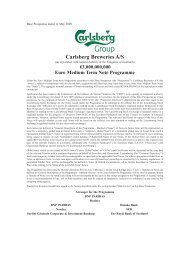
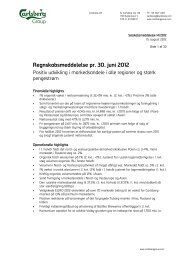

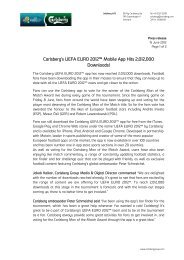
![[Name and Address] - Carlsberg Group](https://img.yumpu.com/49766377/1/184x260/name-and-address-carlsberg-group.jpg?quality=85)
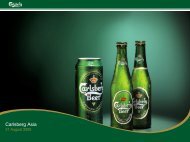
![[Name and Address] - Carlsberg Group](https://img.yumpu.com/49015962/1/184x260/name-and-address-carlsberg-group.jpg?quality=85)
